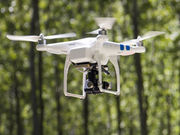Machines might be cheaper, quicker than current delivery methods
MONDAY, June 27, 2016 (HealthDay News) — Drones might offer a cheaper and better way to deliver vaccines to people in developing countries, according to a study published online June 20 in Vaccine.
Using a computer model, researchers concluded that sending drones to deliver vaccines in low- and middle-income countries would be cheaper and quicker than by land-based vehicles. Cars and trucks are limited by road conditions and have high fuel and maintenance costs, the researchers said.
Currently, drones are being tested for medical supply deliveries in rural Virginia, Bhutan, and Papua New Guinea. UNICEF is testing drones to transport lab samples in Malawi. Efforts are underway to use drones to transport blood and essential medications in Tanzania, the researchers noted.
“Assuming that drones are reliable, are capable of making the necessary trips, and have properly trained operators, they could be a less expensive means of transporting vaccines, especially in remote areas,” senior author Bruce Lee, M.D., M.B.A., director of operations research at the Johns Hopkins Bloomberg School of Public Health’s International Vaccine Access Center in Baltimore, said in a Hopkins news release. “They could be particularly valuable when there is more demand for certain vaccines than anticipated and immunization locations must place urgent orders.”
Full Text
Copyright © 2016 HealthDay. All rights reserved.








